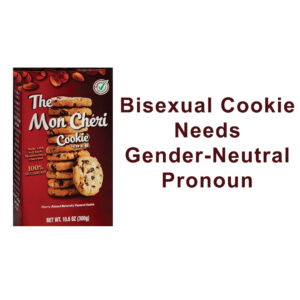Lately, the need for gender-neutral pronouns has been on my mind. It started when my husband purchased The Mon Chéri Cookie from our local HEB grocery store. They are pitched as naturally flavored, cherry-almond cookies containing real Montmorency cherries. The name of the cookie—Mon Chéri—is French and means my darling. The form is masculine. (Ma Chérie is feminine.) French for cookie is le gâteau sec, which translates as dry cake, again masculine. (Note: Checked this all out in my handy English-French, French-English Larousse Dictionary.)
Imagine my surprise when I read the side of the box:
Bonjour mon ami! Meet the Darling of The Big Chip family. H-E-B® The Mon Cheri Cookie!
Cherish every bite of the golden buttery cookie filled with Montmorency (mAWnot-maw-rEHn-see) cherries and rich almond pieces. Our tart and sweet French Canadian treat…. She’s love at first bite. Remember, it’s not bragging when it’s true—BEHOLD and enjoy the H-E-B® The Mon Cheri Cookie! Bon appétit!
Please bear with me on the language lessons. Bonjour mon ami translates as hello my friend, again masculine. Then I read: She’s love at first bite. She? SHE? Why does this cookie now turn into a female? It’s been male all along. Is it because men would be turned off if it said, He’s love at first bite? Are women the only ones who can be savored by biting? And we won’t be insulted by the wording? If you have a clue, let me know.
We need gender-neutral pronouns now! The issue has actually vexed English speakers for years. Since the 1780s, approximately two hundred to two hundred fifty pronouns have been proposed but none took hold. Even the French are grappling with this issue.
Cornell University’s Office of Diversity and Inclusion recommends using one of three sets of commonly used general-neutral pronouns:
sie, hir, hir, hirs, hirself
zie, zir, zir, zirs, zirself
It is also acceptable to use the third person plural (they, them, their, themselves) instead of the third-person singular (he/she, his/hers, him/her, himself/herself) when referring to someone who has not expressed a clear pronoun choice.
|
FOR |
USE | PRONOUNCE |
| He/she |
Sie zie |
“see “zie” |
| Him/her |
Hir zir |
“here” Like “sir” with a “z” |
| His/hers |
Hirs zirs |
“here’s” Like “sirs” with a “z” |
| Himself/herself |
Hirself zirself |
“here-self” Like “sir-self” with a “z” |
Yikes! Will this new way of expressing ourselves stick? Such a change will take years for me to pound into my brain, having grown up in a he/she world. But I believe an old dog can learn new tricks. The time for change has come…. Hmm…. But I still haven’t learned the metric system….
Oh, well. In the meantime, I think I’ll much on some of those bisexual cookies….
To read more Stories About Life, Click Here.
Sign up on www.mariewatts.com to receive future Stories About Life delivered to your email address or read more stories by clicking here.


Recent Comments